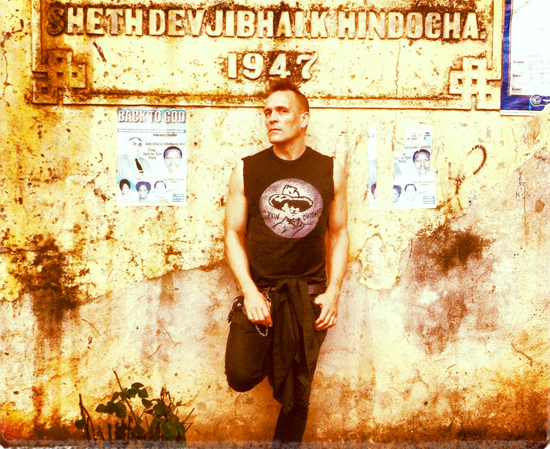The Marabou Stork is a fascinating bird. Ungainly, it flaps around like a ragbag Dino-bird with a clattering call. It comes armed with a body that looks it’s made up from a disconnected pile of spare bird parts. As they crash into the trees they look like some sort of leftovers from an ancient time – cousins of pterodactyls, flapping around in the warm air.
Jinja is Uganda’s second city and the home of the Bayabou music festival organised by the fab UK Unconvention people. I’m wearing a lot of hats, speaking about music journalism, helping out the local music website 034, and advising how to get the underexposed East African musicians better known at a music conference.
East Africa’s music scene is overshadowed by the better known music scenes on the west of the Continent. Congo is the musical powerhouse in these parts and Uganda lives very much in its shadow, with an unfair reputation of creating music that has little originality of its own. This is a misconception, and there are a whole new raft of musicians coming out of the country trying to effect change.
The black and white coloured Pied Kingfishers plunge into the Nile like bullets. They hover in the air with a steely determination, wings flapping in the sunshine. I’ve never seen so many of them, and their two tone plumage is striking against the blue of the source of the Nile.
We are by the main railway bridge coming into Jinja with artist Tracey Moberly as she paints a slogan on one of the railway bridge supports. It’s part of a project for her close friend KLF Bill Drummond’s new book, and we have just paid off the local security to do the painting. For about a fiver the skinny soldier dozes off and the locals stare on a bit bemused at our endeavours.
A large mammal runs in front of the car. It looks like nothing I’ve seen before. It must be three feet long with a long tail with a tassel on the end. Whatever it is (and a few days later I think it was Pangolin, as I look through the 300 mammal species of Uganda listed on Wikipedia), it looks like several animals put together in a ragbag order. We are so shocked at it that we forget to photograph it.
Many of the youth here are rappers, in love with American ghetto culture – the real American folk. We talk to them about taking their hip-hop influences and making a sound of their own, just as they have with so many other forms of music that have come their way over the millennia.
Some of the rappers understand this and are trying to add an African flavour to the sound, rapping in the local Lugandan language. Others are attempting to find a way of making their music have something to do with their own culture, whether that means jamming with local musicians or incorporating traditional sounds.
It’s less interesting to hear people making straight copies of their American heroes, and we talk about this Hollywood-isation of their culture. I tell them that maybe the USA is the showbiz capital of the world, but without Africa there would be no hip-hop and no rock & roll: the youth here today are the descendants of the instigators!
At dusk the sky by the hotel is full of giant flapping bats. Their wingspan must be at least two feet from tip to tip. In the darkening sky you can make out the bone structures beneath their taut skin as they slowly flap around. There are hundreds of them up there, and for an hour they keep skimming and crashing into one particular tree, I can’t quite work out why, but their eerie silent swoops are a reminder of the power of nature.
The problems that the young musicians have in trying to create their music are, as expected, tough. The internet is sketchy here, and ten miles away from Jinja there are the endless small villages of middle Africa – places where running water can be a problem, let alone having Wi-Fi access. Young musicians want to know how to publicise and distribute their music. It’s going to need a lot of work before artists can even approach this in Uganda. It may have to come from the government putting an internet cafe in every major village, as has been part of a programme in India in recent years. Whether you like it or not, the web is key to these times, and countries that spend now will have the upper hand in this new century.
The musicians tell us that you have to buy your tracks onto the radio. Even if you get on, someone can outbid you and buy you back off the air. Perhaps there could be an upside to this in the UK if we adopted this system, and had a mass whip round to buy away Simon Cowell. They also complain that 80 per cent of their music is chart mush – sounds like a good percentage compared to dear old Blighty.
Tracy Moberly, Glastonbury booker Martin Elbourne and I are on an island in the middle of the Nile called Hairy Lemon Island. We are looking out for the red tailed monkey that is meant to live here. It’s my 51st birthday, so it’s a treat. The monkeys are nowhere to be seen, but we see these amazing yellow Weaver birds that are infesting a bush in the middle of the Nile. They are building nests that are perfect spheres, like footballs hanging from the tree. They fly backwards and forwards across the river to a reed bed to collect material.
Uganda is really short of musical equipment and computers, money is tight and there is a lot of sharing going on. What we decide to do on one panel is to make an appeal when we get back to the UK, to everyone out there, to find their old computers or broken bits of musical gear and send them to us. Then we can freight them out to Uganda so the youth can recycle them. A broken computer is better than no computer, and the amazing ingenuity of the musicians here will mean that they can find some use for them.
The musical talent is certainly here. Onstage at the festival I get to pick out the bassline to a swirling drone and a cluster of ancient melodies that go back hundreds of years supplied by two incredible Ugandan musicians – Albert Bisaso Ssempeke on the lyre-like Endongo and Modest on the Adigirgi, a type of one string fiddle. There’s also one of the many local rappers and Jesse Hackett, the keyboard player from Damon Albarn’s Gorillaz.
The music is a soup of great ideas and the connection between the musicians is strong, considering some of them have never met before. As they build the twisting sound I supply a dubbed-out version of punk rock basslines and get lost in an elixir of great sound.
The night air adds to the music’s vibe. Albert is a great player and easy to get a rapport with, as he plays an instrument with a long and rich history. The Endongo, which makes a hypnotic, twanging sound that resonates around its lizard-skin body, originated in Egypt before traveling to Ethiopia and then completing its migration south to Uganda.
The headline act Mr. Mellow mixes Jamaican dancehall with hip hop and some African flavours. In his two tone suit he is a great performer, twirling around the stage like a shaman with silver hair dye poured onto his head. Two hours before the gig we hang out with him in a stifling city centre studio, where he is recording tracks before the show. He asks me to mix one of them for him, but I point out that even in the cramped studio his stuff is perfectly finished and sadly decline the offer.
As the giant bats flap by and the night sky is full of the screeches of animals and birds – we can only hazard a guess at what they are – we finally abandon the idea of a trying to visit the gorillas who live seven hours away up country. Tales of their human-like qualities and gentleness contrasting with their hundreds of pounds of muscle makes the prospect of a trip to see some of our closest mammalian relatives an intriguing one. Yet it seems that what must be a fascinating moment – when they come up to you in the middle of the forest, and stare into your eyes – will have to wait.



